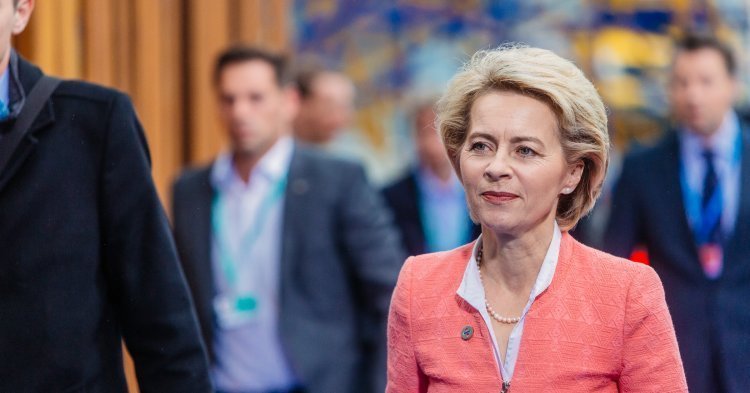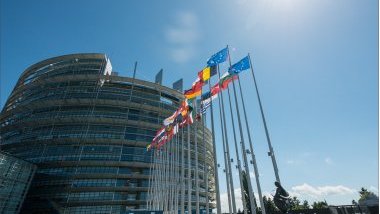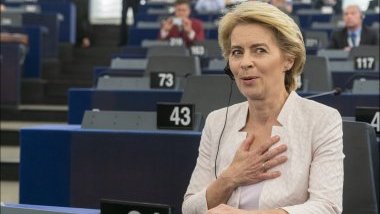Her name didn’t feature among the most likely choices. And still, Ursula von der Leyen, the current German defence minister, will be the next European Commission President… on condition that the European Parliament votes in favour of her on 16 July. This nomination by heads of state and government in the European Council could be the outcome of a long period of negotiation on the successor of Jean-Claude Juncker. The proposal seems to be a Franco-German compromise, accepted by other countries of the EU. So could you talk about a victory of Paris and Berlin? It would be more appropriate to speak of a defeat of European democracy.
Self-described European
However, Ursula von der Leyen has a EUropean profile. Née Ursula Albrecht in Brussels in 1958, from the start of the 1960s she went to the European school in Ixelles, which made her perfectly bilingual between French and German. Later, her studies at the London School of Economics and then at the University of Stanford in California helped her to acquire an excellent command of English.
To be able to speak the three working languages of the European Union is certainly an advantage, in particular compared to the Spitzenkandidat of the centre-right European People’s Party, Manfred Weber. Ursula von der Leyen is, moreover, the daughter of Ernst Albrecht, the former Minister-President of Lower Saxony who made a great European career in the European Coal and Steel Community and in the European Commission.
But it’s above all her political experience that makes the difference. Contrary to Manfred Weber, Ursula von der Leyen has held numerous elected offices at regional and federal levels. In 2001, eleven years after joining the CDU party, she had her first elected mandate in the regional assembly of Hannover, the capital of the state of Lower Saxony. Then, she was elected into the state’s legislature two years later, which enabled her to become a state minister for social affairs.
Von der Leyen entered the federal government in 2005, after Angela Merkel’s first electoral victory - first as a family minister, then labour and social affairs minister in 2009, and finally as defence minister in 2013.
Throughout her entire political career, Ursula von der Leyen hasn’t stopped considering herself a Francophile and a pro-European. Strengthening the Franco-German partnership is fundamental for her. On the 50th anniversary of the Élysée Treaty in 2013, she said that “France and Germany are not only the heart of the European idea, but also its motor”. As for Europe, she has on several occasions appealed for a “United States of Europe” and especially for the creation of a real European amy, at the time when Donald Trump constantly questions American support for European security.
Controversial politician
If the education, political career and European conviction of Ursula von der Leyen make her a rather interesting nominee, her political track record, her level of popularity and her reputation in the German federal government are less promising. While she was credited with positive advancements as the family minister (in particular concerning the family policy) and the labour minister (reform of the Hartz IV unemployment scheme and the creation of a minimum wage in Germany), her aura began to dim when she became the defence minister. The numerous technical problems in the German Bundeswehr, the lack of funds allocated, and the development of the extreme-right in the ranks of the army have earned her many critics.
The nomination of this Angela Merkel ally (von der Leyen is the only member of Merkel’s 2005 government to still hold a post in 2019) has moreover provoked a backlash within the German grand coalition which already was weak to begin with. The Social Democrats have severely criticised the choice of von der Leyen. Martin Schulz in particular levelled scathing remarks, saying that “the weakest minister at our [federal government]” is a “victory for Viktor Orbán and co”.
It is also possible that despite the approval of a large majority of heads of state and government, this nomination could be perceived as the umpteenth Franco-German compromise (impression strengthened by the choice of Christine Lagarde for the European Central Bank) to the detriment of the citizens of the 26 other EU member states. The vote of the European Parliament on the 16th of July risks being tight, as the social democrats are by no means ruling out voting against this choice of the European Council - despite the election of one of their MEPs for European Parliament President later.
Von der Leyen has to prove herself
All these obstacles mean Ursula von der Leyen, who for days after her nomination was almost mute, has to tread carefully. The German minister met Jean-Claude Juncker (who himself deplored the “lack of transparency” in the nomination) and now needs to undertake a campaign to convince MEPs, but also citizens shocked by the non-respect for the Spitzenkandidat principle that was a unique and major democratic innovation of the Lisbon Treaty and the 2014 European elections. Indeed, there is a disturbing gap between the self-asserted Europeanism of von der Leyen and the very undemocratic way she was nominated.
In any case, she is set to lead the European Commission in an EU that is hardly more stable than five years ago. Even if the economic situation is less bad than in 2014 (despite a still poignant necessity of reforming the Eurozone), Eurosceptic and Europhobic populism is still as strong, with a non-negligible representation in the European Parliament.
As the new face of Berlaymont, the seat of the European Commission in Brussels, Ursula von der Leyen needs to work to strengthen the EU’s role on the international arena, together with the EU’s new High Representative for foreign affairs Josep Borrell and the new European Council President Charles Michel. Both internally and externally, the challenges are only about to begin for von der Leyen.






Follow the comments: |
|
